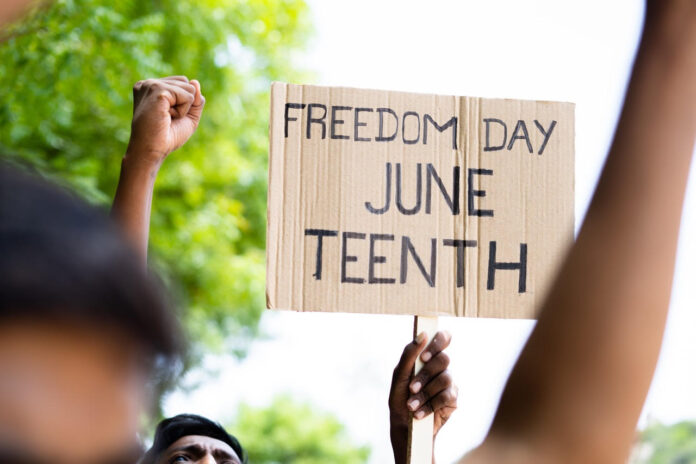
By McKenzie Jackson, California Black Media
When South Central Los Angeles native Nedric Miller was in the third grade he wanted to be gang member. He dropped out of high school when he was 16.
Two years later, Miller was in prison.
“Education wasn’t valuable to me,” he said. “Everyone around me was shooting up, doing drugs — doing this, that, and the third. No one was talking about education. People were trying to survive.”
When was Miller released from prison, he moved to Sacramento with a family friend and enrolled in Woodland Community College as a way to get off parole. He took science classes and discovered he enjoyed learning. Miller eventually received his associate degree and enrolled in Sacramento State. He graduated from the university this year.
“A lot of people lent a hand to me,” Miller said. “Kept me positive. Kept me motivated. Thank you for allowing me to graduate because I really didn’t believe I could.”
Miller’s remarks detailing his journey from the streets to walking across the stage to receive his degree in kinesiology, clinical rehabilitation, and exercise science came during the final day of Sacramento State’s Juneteenth Symposium.
Dr. Nadine A. Kelley, Sacramento State’s senior director of University Housing Services, said it was important for symposium attendees to hear Miller’s college journey.
“We save lives on college campuses,” she said. “You don’t have to be at a hospital to save a person’s life.”
The June 13-14 symposium was held to celebrate and recognize African American history and achievement, while also highlighting the anti-racism work being done at Sacramento State, which has a student body that is 10% Black, and the California State University system’s other 22 campuses.
The event was one of many celebrations scheduled across the Golden State in celebration of Juneteenth on Wednesday. The national holiday commemorates the end of slavery in the United States.
On June 19, 1865, Black people enslaved in Galveston, Texas, learned of their freedom from Union soldiers. This happened two months after the Confederacy had surrendered in the Civil War and more than two years after President Abraham Lincoln’s Emancipation Proclamation.
On June 13, Gov. Gavin Newsom issued a Juneteenth proclamation.
“California is proud to recognize Juneteenth as an official state holiday, honoring the centuries of struggles and triumphs that have brought us to this moment,” the Governor’s statement read. “Amid misguided efforts to rewrite our nation’s history, California is committed to confronting the dark chapters of our past to continue moving forward in pursuit of a more perfect union.”
“This Juneteenth, I urge all Californians to reflect on the ongoing cause of freedom for Black Americans – remembering that, though General Granger’s announcement in 1865 called for “absolute equality,” that vision was, and remains, far from complete. Let us celebrate how far we have come and take stock of how far we must go to truly realize our nation’s founding ideals,” the statement continued.
Across the state, several events are scheduled for Wednesday, including Pleasant Hill’s second annual Juneteenth Celebration at the East Bay Area city’s city hall. The celebration will feature numerous activities such as chess tutorials by West Coast Chess Alliance, a reading by author Mackenzie Lee Foster, and African and Caribbean musical and dance performances. Additionally, there will be a reading of the Juneteenth Proclamation and the singing of “Lift Every Voice and Sing.”
In an announcement video, the Pleasant Hill Diversity Commission noted Juneteenth was initially celebrated at family and church center gatherings. There were also annual trips to Galveston Bay by formerly enslaved people and their families.
“Celebrations spread across the South became more popular in the 1920s and 1930s,” said Carson Sprott, the commission’s chair. “In 2020, the country’s important social justice movement renewed national interest in racial equity including the day that many consider our country’s second Independence Day.”
On June 19 in Los Angeles, actress Wendy Raquel Robinson will host Juneteenth at the Wilfandel, the oldest African American women’s club in L.A. This alcohol-free event will feature food, vendors, live entertainment and more.
In Oakland, the Hella Creative, an arts and culture collective is hosting Hella Juneteenth, a cookout featuring live music, Black chefs and Black-owned restaurants from 1 p.m. to 5 p.m. at the Oakland Museum.
In Pasadena, the local branch of the NAACP hosted the third annual Roller Jam at Pasadena City Hall. The event had arts and crafts, a live DJ, and roller skating.
On June 15, the third annual Juneteenth Festival at Black Miners Bar in the Folsom Lake Recreation Area featured a performance by the Grammy-award winning R&B group Club Nouveau. There was also beer and wine garden featuring Black-owned wineries and distilleries, food vendors, a petting zoo, a kid’s zone, and horseback riding.
Sacramento State’s Juneteenth Symposium featured award presentations, musical performances and panel discussions and speeches by a number of scholars and educational leaders, who discussed topics such as racial injustice and the lived experiences of everyday Black Californians.
Dr. Ibram X. Kendi, the founding director of the Boston University Center for Antiracist Research, discussed anti-racism.
“We have been taught the opposite of racist is not racist,” he said. “The actual opposite of racist is anti-racist. The heartbeat of the being racist has historically been denial, and the sound of that denial has historically been, ‘I’m not racist.’ What we should be striving to be is anti-racist.”
This resource is supported in whole or in part by funding provided by the State of California, administered by the California State Library in partnership with the California Department of Social Services and the California Commission on Asian and Pacific Islander American Affairs as part of the Stop the Hate program. To report a hate incident or hate crime and get support, go to CA vs Hate.



